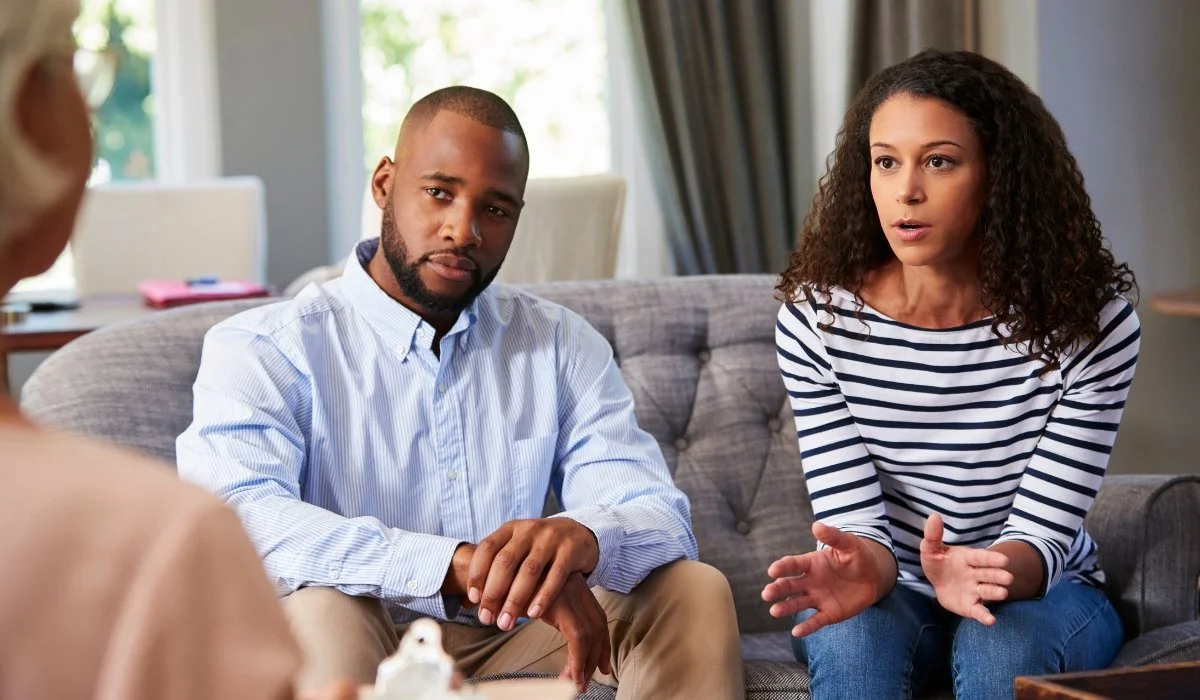Can marriage counselors recommend divorce while respecting client self-determination and addressing safety concerns such as abuse? Therapists carefully evaluate if advising separation or a safety plan is necessary when a couple is heading for divorce, always prioritizing the well-being of their clients.
Understanding Client Self-Determination and Safety Concerns
When couples try marriage counseling, they often wonder: Can marriage counselors recommend divorce? The answer is no. Therapists don't tell you what to do. They help you find your own way.
Marriage counselors want to empower you. They support and guide, but never judge. Their job is to help you clarify your feelings.
Client Self-Determination in Marriage Counseling
Client self-determination means you get to make your own choices. This idea is key in therapy. Here's what it looks like:
Informed Consent: You learn about the counseling steps and what they mean.
Client Autonomy: Your feelings and goals are respected.
Therapeutic Alliance: Trust grows between you and your counselor so you feel safe.
Good therapists act as guides, not judges. They focus on helping you understand what's best for your relationship health.
Safety Concerns in Marriage Counseling
Sometimes, safety concerns change how counseling works. Abuse—whether physical, emotional, or financial—needs special attention. Here's how therapists handle these situations:
Intervention in Abusive Relationships: Therapists look for abuse signs and focus on safety.
Safety Planning: They help victims figure out safe steps if they want to leave.
While therapists don't push divorce, they help clients explore options with safety as the priority.
The Therapist's Role: Guide, Not Judge
Marriage counselors help couples find their way but don't make decisions for them. Their role is to stay neutral and support client self-determination. They don't tell couples if they should divorce or stay together. Instead, they help partners look at their feelings and goals.
Therapists follow strict ethical guidelines. These rules stress staying impartial and respecting each person's autonomy. Counselors focus on a pro-relationship health approach that boosts good communication and understanding—no matter what the couple chooses.
Maintaining Neutrality and Support
Therapists must stay neutral during counseling sessions. They avoid taking sides when partners disagree. Counselor impartiality helps build a strong therapeutic alliance—a respectful partnership between therapist and clients. The pro-relationship health approach focuses on:
Better communication skills
Conflict resolution
Emotional connection
Overall relationship well-being
Neutrality doesn't mean therapists do nothing. Instead, they guide talks without pushing for divorce or staying married. This balance lets couples explore options safely while focusing on what helps their relationship long term.
Ethical Guidelines for Marriage Counselors
Marriage counselors follow rules set by groups like AAMFT in the Code of Ethics. These rules cover:
Confidentiality
Respect for client autonomy
Avoiding harm (non-maleficence)
Being competent in therapy areas, including divorce decisions
Transparency about qualifications
Following these ethics protects clients and keeps care high quality. Therapy fits each client instead of using one-size-fits-all advice.
Addressing Safety Concerns in Counseling
Safety comes first when abuse shows up in a relationship. Counselors look for signs of domestic abuse—whether it's physical, emotional, or financial. They act carefully to keep everyone safe. Emotional safety during counseling helps clients feel okay sharing their stories without fear.
When abuse is present, therapists change their role a bit. They don't just help couples talk; they work to protect partner safety and well-being. Sometimes this means stopping joint sessions if one partner feels unsafe. They also offer individual help focused on safety planning.
Recognizing Domestic Abuse and Its Impact on Therapy
Domestic abuse is more than just hitting or pushing. It can be emotional manipulation, controlling actions, or money control too. These types of abuse mess with mental health and make therapy trickier.
Trauma-informed counseling keeps these facts in mind. It puts client safety and trust first before digging into relationship problems. Therapists stay neutral but watch closely for signs of ongoing harm or pressure inside the couple.
Knowing how different abuses affect people helps counselors choose the right approach.
Counselor Responsibilities When Abuse Is Present
Counselors must follow rules when they see abuse in couples therapy:
Keep Privacy But Act When Needed: They guard client secrets but must report if danger is close (like mandated reporting).
Stay Neutral: Being fair helps them see things clearly but doesn't excuse bad behavior by anyone.
Share Resources: They tell clients about local help for domestic violence so choices come from good info.
Set Limits: Therapists say what's okay in sessions; abusive acts may stop or end meetings.
Support Client Choices: They let clients decide whether to stay or leave safely without pushing divorce.
Take Action When Needed: If harm threats arise, counselors work with authorities using professional rules such as AAMFT ethics.
By sticking to these duties, marriage counselors keep ethical standards high and create safe spaces for healing—even when abuse makes things hard.
Discernment Counseling for Mixed-Agenda Couples
Discernment counseling is a type of couples counseling made for mixed-agenda couples. This means one partner may want to end things, while the other wants to save the relationship. It gives both partners space to figure out what they really want, without pressure or judgment.
Instead of trying to fix everything right away, discernment counseling focuses on helping partners make smart decisions. They can decide if they want to reconcile, separate, or just pause and think things over.
Purpose and Approach
Discernment counseling centers on two big ideas: therapeutic neutrality and client self-determination. The counselor doesn't push you toward any choice. Instead, they help you explore your feelings honestly.
During sessions, therapists guide mixed-agenda couples through tough talks about their relationship problems. They don't rush into fixing things or making quick decisions. The goal is to clear up confusion and let each person understand their own feelings better.
Helping Couples Decide
Discernment counseling helps couples figure out one of three paths:
Reconciliation: If both want to keep trying, they can move into regular couples therapy. This helps them rebuild trust and communicate better.
Separation Planning: Sometimes parting ways makes sense. The counselor helps plan this carefully so it's as smooth and friendly as possible.
Time-Out: Taking a break from deciding lets emotions cool down. Later on, clearer choices might come easier.
Each choice respects what the couple wants rather than pushing any agenda. That makes this counseling good for mixed feelings in tough spots.
Understanding When Divorce or Separation May Be Considered
Therapy for deciding whether to divorce lets partners understand conflicted feelings and see signs a couple may be heading toward divorce. Here are some common signs:
Communication breaks down often
Conflicts stay unresolved
Emotional distance grows
Hurtful behavior repeats
These signs make couples seek help for relationship decision-making. Therapists support this painful decision but don't push clients toward divorce or separation. They help couples reflect honestly on their situation.
The Counselor's Role in Facilitating Amicable Separation
When couples choose to separate, counselors help make the process amicable. Counselor impartiality is key so both partners feel respected during separation planning. Counselors provide supportive guidance by helping with:
Co-parenting plans
Financial issues
Emotional support during divorce decisions
Therapeutic neutrality means counselors stay neutral and promote respectful communication without picking sides.
Balancing Support Without Recommending Divorce
Marriage counselors follow client self-determination closely—they guide, not judge. They give couples tools to decide their relationship's future on their own.
This pro-relationship health approach means therapists stay neutral whether couples want to reconcile or separate. They encourage respectful communication that helps partners understand each other even when talks get tough.
Counseling focuses on clear thinking instead of telling clients what to do. It gives space for both people to share needs without pressure toward any choice.
Enhancing Communication and Conflict Resolution Skills
Good communication is the key to fixing marital conflict. When couples face a communication breakdown, confusion and hurt feelings often follow. Marriage counselors teach couples how to improve their communication skills by using conflict management strategies that lead to constructive interaction.
Ways to improve communication and manage conflict:
Practice respectful, calm talking
Listen without interrupting or judging
Express feelings clearly and honestly
Use "I" statements instead of blaming
Take breaks if things get too heated
Addressing Underlying Issues Affecting the Relationship
Many problems in marriage come from deeper issues like incompatible partners or trust problems in marriage. Therapy looks for these hidden causes and helps couples find ways to cope with marital stress.
Common underlying issues include:
Feeling like partners don't fit well together
Doubts or broken trust between partners
Stress from outside pressures or daily life
Habits that block intimacy or open sharing
Empowering Couples to Make Their Own Decisions
Counseling puts client self-determination front and center. Therapists support autonomy by helping clients make their own choices about their relationships.
Couples get advice but keep control over what happens next—whether staying together or parting ways. Respect for client autonomy keeps therapy focused on what works best for each person's values and hopes.
Encouraging Open Dialogue and Understanding
Open and honest communication builds a strong therapeutic alliance between counselors and couples. When partners feel safe sharing openly, they develop mutual understanding.
This safe space invites vulnerability. Partners can reveal feelings they usually hide. That honesty is needed for real change.
Benefits of open dialogue:
Builds trust within therapy sessions
Lets both sides be heard fully
Reveals hidden emotions shaping behavior
Respecting Individual Goals
Each person brings different relationship goals into therapy. Some want to stay together; others think about separation.
Good counseling respects these goals by adapting its approach instead of using one plan for everyone. Recognizing individual wishes helps couples cooperate even if their paths differ.
Pivotal Counseling, LLC - Supports Your Journey Forward!
At Pivotal Counseling, LLC we focus on a pro-relationship health approach built around your needs as a couple—and as individuals dealing with complex emotions together or apart. Our therapists listen with care while honoring your autonomy throughout every step. We provide helpful tools like better communication techniques and support that addresses deeper concerns.
Ready to take the next step? Schedule a consultation tailored to your relationship's unique needs today.








